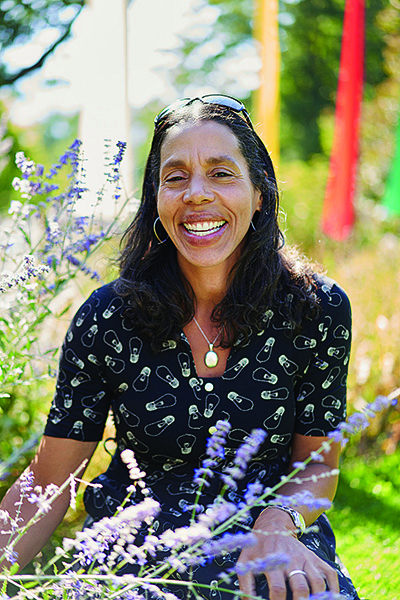
Jeanine Canty ’92 sees connections: between people and nature, personal and collective. “My first semester at Colgate, a professor brought together Gandhi and ecology,” Canty recalls. “I was 18 and hardly understood his focus on ‘interrelatedness,’ but that planted a seed.” It grew into a career of uncovering links between social and ecological issues through the lens of ecopsychology. Her new book, Returning the Self to Nature: Undoing Our Collective Narcissism and Healing Our Planet, equips readers to understand and begin to restore those links in their own lives.
“Ecopsychology looks at how people are disconnected from nature,” Canty explains. She boils down the basic tenets: “The planet needs healing from climate change and destruction. People need healing from illness, violence, estrangement, addiction. Earth’s suffering and people’s suffering are directly connected. This all takes place in the context of a globalized, corporate consumer culture hyper-focused on individualism and pursuing wealth.”
As a professor at the California Institute of Integral Studies and a guest teacher at several other schools, Canty had been writing, researching, and teaching ecopsychology for years before this book. Narcissism’s role, however, was new to her. Early ecopsychology writers had connected the dots between narcissism and consumerism; Canty took this further by studying narcissism and concepts of “self” across academic research, philosophical traditions, and pop culture therapy.
She learned that Narcissistic Personality Disorder is often linked with a childhood in which caregivers could not or would not create deep connections. “Despite that, so many sources demonize narcissists,” she says. “Top literature recommends cutting ties with them.” When you do, the person simply feeds on someone else’s attention and energy. The cycle of harm continues. Due to this — and the growing number of people who exhibit narcissistic patterns — Canty believes narcissism should be addressed as a collective issue.
“Everyone’s a narcissist,” she says. “It’s not about labeling anyone. It’s not a finger-shaking.”
Instead, it’s an opportunity to realize that our suffering and the damage we’ve inflicted on our planet stem from the same root — and the same practices can help us heal ourselves and the environment.
In her book, Canty provides a primer on narcissism before demonstrating how collective narcissism evolved from Western social structures that distance us from nature- and community-based traditions.
“The globalized, corporate consumer culture conditions us to think in certain ways, to be self-focused yet insecure. ‘How do I look? How do people see me?’ All our time and attention go there,” Canty explains. “We’ve lost a deep connection with our inner life and the sense of deep community we need to be healthy.
“That makes it easier to see people and Earth’s resources as disposable,” she adds. “To not question systems that ignore human dignity.” This is how our collective narcissism intertwines with large-scale social and environmental issues: poverty, mental illness, school shootings, political polarization, climate change.
The good news is that we can heal by changing our collective ways of being in nature, in community, even in business. The last portion of Canty’s book provides readers with what she calls “patterns and practices” to help readers “feel whole, able to love who we are rather than who we think we need to project, and then extend compassion to people we perceive as ‘other.’”
